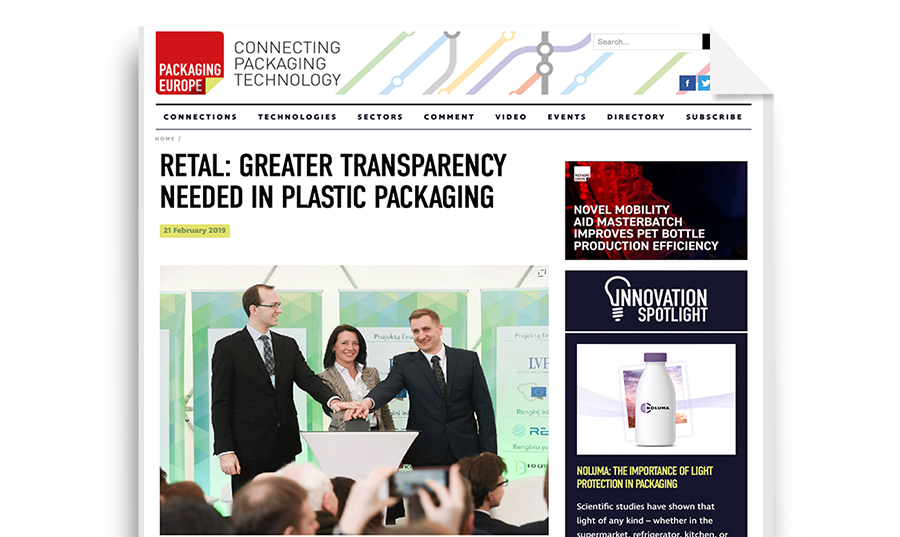
Sustainability. Innovation. Disruption. Words that get used freely. The time has come to prove what we say.
Across the packaging value chain, sustainability, innovation and disruption are all more necessary now than ever before...as long as there's transparency too. The bright light that is shining on the plastic packaging industry is not always flattering; it shows up our imperfections. But with transparency, that bright light is a good thing. For us to be as honest and progressive as possible, to create and support a plastic packaging industry that is fit for purpose from both a consumer and an environmental perspective, transparency has to be at the heart of everything we do.
Emmanuel Duffaut, Sustainability Director at global plastic packaging manufacturer RETAL, is vocal about the need for transparency across the packaging value chain. Duffaut says, “Climate change and the circular economy are the two main sustainability drivers for our industry; action has to be proactive, productive and provable. I'm determined that every CSR action must be quantifiable and realistic.”
The discrepancy between what consumers think about plastic packaging and what is actually true is huge. For example, a commonly-held belief is that plastic bottles can only be recycled once, when actually they can happily be recycled 7-9 times before quality is compromised for food-grade applications, and many more times for non-food packaging. And an organic cotton shopping bag would need to be reused thousands of times to match a plastic shopping bag for water, energy and additive consumption in production. Yet consumers think that choosing cotton shopping bags over plastic bags is the sustainable option...but how many cotton totes do you actually own?
Duffaut continues, “Transparency isn't about the feel-good factor; it's about the truth. For climate change, we need to talk about renewable energy and production. Last year, RETAL installed the largest solar panel plant on the roof of its Lithuanian facility – it's the biggest photovoltaic installation in the Baltic States and will generate 1.4 megawatts of power per year. The factories in the US, Lithuania and Czech Republic buy 100 per cent renewable electricity. Management systems are key too, plastic packaging manufacturers must be able to prove responsibility of performance, such as with the ISO 50001 certification and energy monitoring systems we have across RETAL plants.”
In terms of the plastic packaging itself, manufacturers are also capable of transparency, literally and figuratively. The incredible capabilities of rPET are currently limited by effective and efficient collection, yet the potential for consumer education is great. Duffaut adds, “Reliable supply of rPET – reliable in quality and quantity for food applications - is crucial to a realistic circular economy. RETAL produces a 100 per cent rPET bottle for Nestlé Pure Life mineral water in the US, where our dedicated R&D team worked with Nestlé Waters to create a totally transparent rPET that delivers the glass-like look that consumers want, thanks to our deep knowledge of additives and equipment fine-tuning; none of that slightly grey rPET here! We have an incredible knowhow of working with up to 75 per cent rPET flakes and the specific additives required.”
RETAL has recently joined PETcore, the responsible voice of the European PET value chain, with Duffaut active in the non-profit's working groups that is focused on the long-term stability of the PET industry. He concludes, “By creating responsible plastic packaging that has a lighter impact - including light-weighting of the preform and the closure, highly efficient energy management across production and smart use of renewable energy - we are determined to be part of the solution."